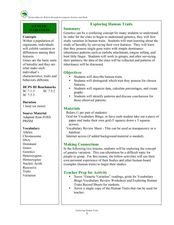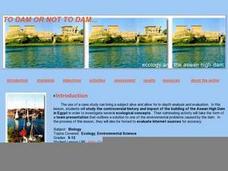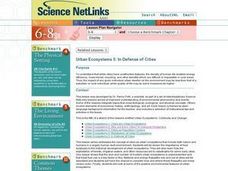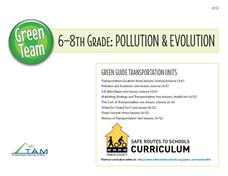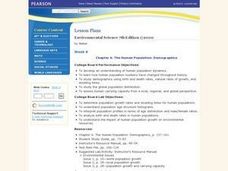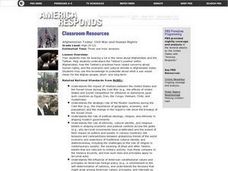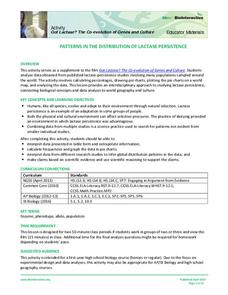Curated OER
America Moves to the City (1865-1900)
Statistical data can show shifts in human populations without bias or a prescribed historical point of view. View bar graphs and charts that describe new influxes in urbanization, immigration, and suffrage by state during the turn of the...
Howard Hughes Medical Institute
Zebrafish and Skin Color
You may not know if that zebrafish in your fish tank is a model citizen—but it is definitely a model organism! What can we learn about ourselves from a tiny zebrafish? Discover more about the polygenic trait of skin color through a...
National Institute of Environmental Health Sciences
A Student Exploration of the Impacts of Climate Change on Human Health in the United States
Let the data drive the science. Learners examine data provided in resources to discover connections between climate change and health of vulnerable populations. They study trends and present findings using their choice of projects.
Curated OER
Population Dynamics of Growth of Drosophila
Students investigate population dynamics such as variation in density of females, composition of food sources an environmental factors such as light and temperature on Drosophila. They then relate their findings to human populations and...
Curated OER
Human Footprint
Students study facts about humans and how they are impacting the Earth. In this investigative lesson plan students help map peoples footprints over the Earth's surface and evaluate these factors.
Curated OER
Studying the States!!!
Students explore the fifty states of America. They also learn the capitals and locations of the states. They also study the population, mottos, flags, and interesting historical facts about each state.
Curated OER
Human Ecology: How it Relates to Population
Ninth graders are introduced to the concept of population. In groups, they research the problems associated with overpopulation and underpopulation. They practice calculating birth and death rates and discus how they can be used to...
Curated OER
Populations in the Path of Natural Hazards
Students read "Geographical Mobility: 1995-2000." They examine the maps in the handouts and compare them with maps from an atlas. In the second part of this lesson, students read "In Harm's Way." They receive three more handouts, one a...
Curated OER
Physical and Human Geography Review Worksheet and Study Guide
In this geography skills worksheet, students respond to 30 short answer questions pertaining to physical and human geography.
Curated OER
Population Needs vs. Population Deeds
Pupils examine the recent population explosion of the world. After watching a demonstration on closed systems, they identify the role humans have on the depletion of natural resources and lowering the standard of living. To end the...
Curated OER
Exploring Human Traits
Students explore human behavior by participating in a class science game. In this human characteristics lesson, students identify different human traits that are passed down by each generation and the purpose each of them have. Students...
Curated OER
Mountain Lions in Arizona Overview
Here is an overview to a unit on the mountain lions of Arizona. Six different lessons take youngsters on a complete investigation of the adaptations, diet, population density, and management of these beautiful wild cats. Each of the...
Curated OER
To Dam or Not to Dam
Young ecologists explore the Aswan Dam in Egypt via the internet. Each collaborative group is assigned a specific article about the ecological impact of the dam. Then they prepare a presentation to share with the rest of the class. Some...
Curated OER
"The Island of Plenty": Reading Guide
Johnson C. Montgomery’s controversial plea for American social isolationism, “The Island of Plenty,” launches an in-depth study of the structure and logic of the essay. After responding to a series of questions, individuals craft a...
Curated OER
Urban Ecosystems 5: In Defense Of Cities
Students explain that while cities have unattractive features, the density of human life enables energy efficiency, mass transit, recycling, and other benefits which are difficult or impossible in rural areas. This is the fifth in an...
Curated OER
California's Golden History: 1848-1880
Using a variety of online resources, learners study life and society in California during the gold rush. They use a map to identify area where gold was located, explore pre-selected websites, describe mining practices, and create an...
Beyond Benign
Ecological Footprint
How does your lifestyle measure up in terms of your ecological footprint? Young ecologists examine their impact on the planet using an insightful online calculator. A short quiz asks users to rank the size of their homes, their energy...
US Department of Commerce
Community Change
America is a country on the move. Analyzing data from the Census Bureau, class members gauge the people moving in and out of their areas. An interactive web feature allows pupils to see who is moving out and moving in, while discussion...
Safe Routes to School
Pollution & Evolution
Bring together a study of two major scientific topics with a lesson plan on the relationship between pollution and evolution. With the help of a PowerPoint presentation, hands-on activity. and class demonstration young scientists...
Curated OER
Chapter 6: The Human Population: Demographics
Students read the indicated text and complete several suggested labs and activities. They answer critical thinking questions. This instructional activity is very hard to do without the indicated text.
Curated OER
Early Humans
Sixth graders read about the different types of Humanoid. They examine the different cultural beliefs and their own personal beliefs about evolution. They research the species using the scientific theory about evolution.
Curated OER
Carbon Monoxide and Population Density
Tenth graders investigate the carbon monoxide level at a fixed latitude to determine if there is a relationship to population density. They download data sets and generate a graph, and find locations using the Earth's coordinate system....
Curated OER
Afghanistan Today: Civil War and Human Rights
Students examine the relationship between the United States and the Soviet Union during the Cold War. They analyze the role of religion and cultural identity in shaping governments. They also examine the United States foreign policy.
Howard Hughes Medical Institute
Patterns in the Distribution of Lactase Persistence
We all drink milk as babies, so why can't we all drink it as adults? Examine the trend in lactase production on the world-wide scale as science scholars analyze and interpret data. Groups create pie charts from the data, place them on a...










